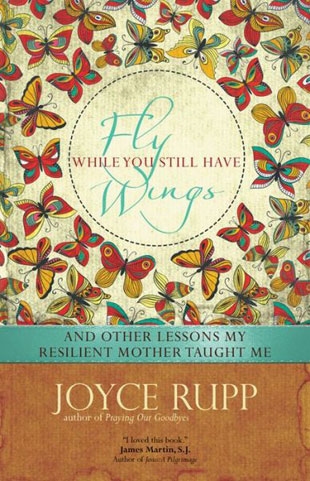"This quality of openness continued to manifest itself as Mom grew older. Other innate qualities I admired about her, such as determination, feistiness, generosity, other-centeredness, and kindheartedness ripened. I grew daily in admiration of how my aged mother maintained a passion for life and kept the fire of her spirit alive in spite of a significant amount of physical pain and discomfort. Up to the very end, she entered into and enjoyed life to the utmost. Five years before her death, I went over some questions about aging with Mom. When I asked for advice about growing older, her first response summed it up: 'Go with the flow.' "
— Joyce Rupp
In this uplifting and deeply spiritual memoir, Joyce Rupp pays tribute to her mother Hilda Rupp (1916 - 2000), wife to an Iowa farmer and mother of eight children. This woman with a Germanic background was not afraid of hard work and developed a keen resiliency which helped her overcome adversities, such as the death of a son when he was only 23. Her only respite from poverty was when she worked as a nanny and housekeeper before she got married.
Still, Hilda was gifted with a positive can-do attitude and a lively hospitality. She passed on to her children a love and respect for the natural world. Rupp has certainly made the most of that legacy with her prose and poetic enchantments with trees, plants, and all living beings.
Despite all her energy and good deeds, Hilda was verbally abused by her husband, and it is a miracle that she didn't become a bitter old woman. Instead, even in her seventies and eighties, she explored new vistas, loved music, and had a good sense of humor. In addition, this elderly woman found great fulfillment by being active in the local Catholic parish.
Typical of her generation, Hilda did not talk much about her spirituality. Even so, Rupp is alert to the little kindnesses she performed for others. She commends her "desire to be a God-centered woman" and revels in her mother's late-in-life friendship with Wilda, a soul mate who brought "expansiveness" to her Mom's wings. After this life-bringer's death, Hilda feels the pain of loneliness.
Rupp laments the deluge of physical impairments which dragged her mother down. Rupp was shocked by Hilda's depression and loss of energy after a heart attack. Each illness and health crisis took away more of her mother's control over her life. The author was gratified when she talked about death with her. And after her passing, Rupp admits it took her ten years to "untangle the guilt and remorse I felt."
More than 42.5 million Americans are now providing care for an elder family member, an arrangement common around the world. And many others wish they could be more present to an aging parent. Rupp's loving tribute to her mother reminds us to count the blessings we have received from a parent. And her honest admission that she, like many of us, experienced regrets over what she could have done for her mother and didn't, or did do and wished she hadn't, frees us to process these experiences in our own lives. This book is highly recommended for those who truly want to honor their mothers and their fathers.
